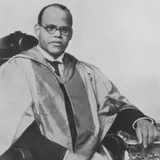
Dr Harold Moody
Civil rights activist
Biography
Dr Harold Moody (Medicine, 1910) was a prominent humanitarian, anti-racist campaigner and civil rights activist. The son of a pharmacist, Harold Arundel Moody (1882–1947) was born in Kingston, Jamaica, and travelled to England in 1904 to study.
Despite his academic achievements, Harold was unable to gain work as a physician because of the colour of his skin. He was denied a hospital job because the matron refused to ‘have a coloured doctor working at the hospital’ and was rejected for the post of medical officer for the Camberwell Board of Guardians, being told that people did not want to be treated by a black man. After three years of unsuccessful job-hunting, Harold set up his own practice in Peckham, south London, in February 1913. Later that year, he married Olive Mable Tranter, a white nurse whom he had met and courted as a medical student. They would go on to have six children together. Through his interactions within the community, he became increasingly aware of racial injustices and, along with the prejudice he had faced as a student (he found it difficult to find lodgings and other students didn’t speak to him) and as a qualified doctor, he was motivated to campaign for the rights of black people.
In 1931, Harold became one of the founders of the League of Coloured Peoples (LCP), a pressure group whose aims were to highlight the problems and successes of black people, to challenge racial discrimination and to fight for equality. Harold worked tirelessly lobbying politicians, the civil service and trade unions, seeking to build and strengthen race relations and challenge injustices, and he served as the LCP’s president right up until his death. His work included fighting for the lifting of the colour bar in the British armed forces, fair wages for Trinidadian oil workers and employment rights for black seamen. In 1943, Harold was appointed to a government advisory committee that looked at issues on the welfare of non-Europeans.
The LCP gained influence during the Second World War and, in 1944, organised a three-day conference in London to draw up a Charter for Coloured Peoples, in many ways foreshadowing the resolutions of the fifth Pan-African Conference held in Manchester the following year. It demanded full self-government for colonial peoples at the earliest possible opportunity, and insisted that ‘[t]he same economic, educational, legal and political rights shall be enjoyed by all persons, male and female, whatever their colour. All discrimination in employment, in places of public entertainment and refreshment, or in other public places, shall be illegal and shall be punished.’
In the winter of 1946, Harold went on a five-month tour of the West Indies and America to raise money for a cultural centre in London. He fell ill and passed away shortly after his return to the UK in April 1947. The League he founded survived him by four years, but Harold’s campaign for civil rights has been credited as being the key to influencing the Race Relations Act 1965 – the first legislation in the UK to prohibit discrimination on the grounds of colour, race, ethnicity or national origins. The Act saw the introduction of the offence of ‘incitement to racial hatred’ and led to the creation of the Race Relations Board in 1966.
To honour Dr Harold Moody’s legacy in laying the ground for racial equality, in summer 2021, King’s and the Centre for Doctoral Studies launched the Harold Moody PGR Studentships to support underrepresented communities within postgraduate research students.
Features
Dr Harold Moody Studentships
Dr Harold Moody Studentships

Features
Dr Harold Moody Studentships
Dr Harold Moody Studentships

